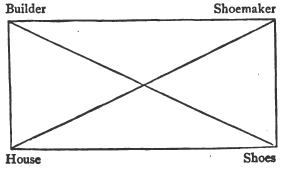In the fifth section of the fifth book of The Nicomachean Ethics, Aristotle expands on his theory of just exchange and introduces his understanding of the purpose of money.
First, he notes that just exchanges are not based on equality but on proportionality. This is for two reasons. One is that people do not necessarily begin from a point of equality vis-a-vis each other, and so a just exchange between them is not one that brings them into equality, but one that preserves their preexisting inequality. The rather ugly example he uses to illustrate this is that of an official wounding some schmoe as opposed to some schmoe wounding an official. In the first case, it would be wrong to suggest wounding the official as a way of restoring justice; but in the second case it would be insufficient to wound the schmoe, but the schmoe should be additionally punished. The value of the wounds is proportional to the value of the people being wounded, and so the rectifying act must take this into account.
(It is both the ability to revenge evil with proportional evil on the evildoer, and the ability to bestow good proportionally on someone who has done one a favor, that holds a society together. The Graces, or Charities, were the Greek anthromorphizations of the mutual exchanges of good-for-good that held this society-cementing purpose, and Aristotle notes the important place of temples to the Graces in Greek society.)
The second reason is that in voluntary transactions, there is no way of determining an equality. People do not exchange actually equal goods, because there would be no point. People exchange different goods because each one wants what the other one has more than they want what they have.
For instance if a house-builder and a shoemaker want to exchange their products, and they want to do this justly, they must find some way of making their exchange correctly proportional. Clearly, trading a pair of shoes for a house isn’t going to do the trick. We need some way of coming up with a common quantitative measurement of otherwise incommensurable products and services so that a just rate of exchange can be determined.

Illustration from The Ethics of Aristotle: with Introductory Essay by George Henry Lewes, originally translated by D.P. Chase in , showing the exchange relationship between a builder, a shoemaker, and their products: a house and shoes.
Aristotle says that money exists to provide this common quantitative measurement. But how is this measurement made in the first place? Aristotle says that it is “demand” that initially creates the measurement and that money is only the units we use to denominate it. Actually, he says “chreia,” not “demand,” which may be misleading, but I’m following the lead of the majority of the translators I’ve been consulting.
Scott Meikle in Aristotle’s Economic Thought () argues that this translation is too facile and was motivated by a desire to mold Aristotle into a presager of classical economics. He says that “chreia” might also be translated in terms of such things as “ ‘use’, ‘advantage’, [and] ‘service’,” which would leave a much different impression.
But, for the purposes of this discussion, just plug in your favorite determiner of value: cost-of-production, supply-and-demand, subjective-want, whatever. Aristotle says that a just exchange is one that preserves the correct proportionality of goods, in terms of this determiner, but denominated with the medium of exchange, that is, money. It is this way in which unequal goods can be compared as though they were qualitatively equivalent, if only for the purposes of just economic exchange.
Imagine, for instance, an exchange of shoes-for-food between a shoemaker and a farmer. If they come to a mutually-satisfactory ratio of shoes-to-food, you can determine from this the value ratio of the two products, and can use this information to solve, mathematically, other ratios. In other words, if you know the value ratio of shoes to food, and you know the value ratio of food to houses, then you can determine how many shoes you’d need to exchange for a house.
![Husbandman (Α); Shoemaker (Β); Food (Γ); Shoes [Δ + (Γ−Δ)] equalized to Γ. That is, Α∕Γ = Α∕[Δ + (Γ−Δ)]. That is, Α is in the same proportion after his exchange as before.](Brewer_V_7.png)
Illustration from The Nicomachean Ethics of Aristotle with English Notes by John S. Brewer () showing Aristotle’s example of the proper way of regulating an exchange of food for shoes between a farmer (husbandman) and a shoemaker.
Well… in theory, anyway. In practice, nobody is willing to take a warehouse full of shoes in exchange for a house. That’s where money comes in. It’s a semi-stable value measuring stick that permits the quantitative comparison of a huge variety of goods and services for the purposes of facilitating exchange. It simplifies this process of triangulating on the appropriate ratio between two qualitatively-different goods (say food and houses) from previous exchanges of qualitatively-different goods by replacing these barter ratios with single quantities.
Money makes just exchanges practical and easier; but it is the existence of a dimension on which they can be quantitatively compared for the purposes of exchange (chreia) that makes these exchanges possible in the first place.
Aristotle wraps this up by reminding us that Justice, being a virtue, needs to be seen as a mean between two opposing vices. One vice is in committing injustice so as to get more than you deserve; the opposing vice is in being unjustly treated so as to get less than you deserve.
Index to the Nicomachean Ethics series
Aristotle’s Nicomachean Ethics
- Introduction
- Book Ⅰ
- Book Ⅱ
- Book Ⅲ
- Book Ⅳ
- Book Ⅴ
- Book Ⅵ
- Book Ⅶ
- Book Ⅷ
- Book Ⅸ
- Book Ⅹ
- Bibliography
